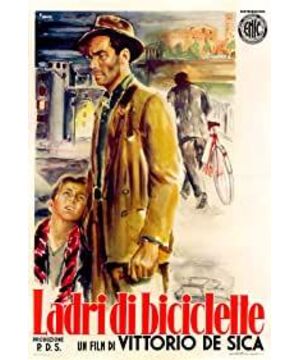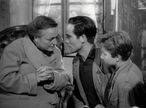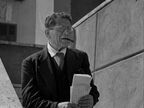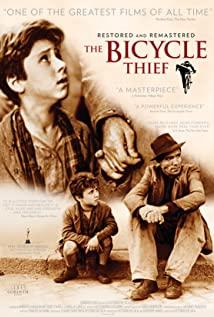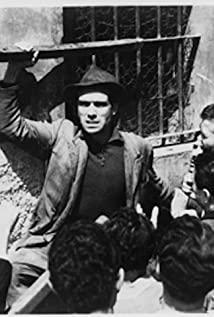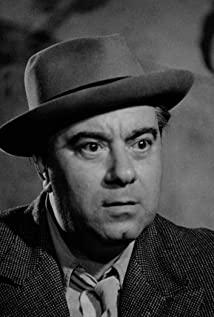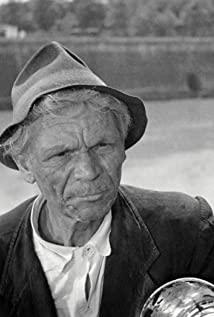The film tells the story of Antonio Ricci, an unemployed man in the depressed post-World War II economy of Italy. With no money and a wife and two children to support, he is desperate for work. After all efforts he could make, he is delighted to at last get a good job hanging up posters, but on the sole condition that he has a bicycle which must be used for work. He is told unequivocally: “No bicycle, no job.” In this choice, his wife Maria pawns their bed sheets in order to get money to redeem his bicycle from the pawnbroker. It seems that Ricci will earn his life on the job, But the real life is cruel.
Unfortunately, life betrayed him.
Early on in the film, Ricci's coveted bicycle is stolen by a bold young thief who snatches it when he is hanging up a poster.
Ricci thinks that the police will take the theft very seriously, but they are not really interested in the petty theft of a bike. The only option is for Ricci and his friends to walk the streets of Rome themselves, looking for the bicycle. After trying for hours with no luck, they finally give up and leave.
Desperate for leads and with his better judgment clouded, Ricci even visited the dubious backstreet fortune teller that he had earlier mocked, in the hope that she may be able to shed light upon the bike's whereabouts. However, she merely doles out to him one of the truisms that form her stock in trade: "you'll find the bike quickly, or not at all." Feeling cheated, a crestfallen Antonio hands over to her some of the last money that they have. After a rare treat of a meal in a restaurant, Ricci admits to his son that if he isn't able to work, they will simply starve.
Ricci finally manages to locate the thief (who, it seems, had already sold the bicycle) and Bruno slips off to summon the police to the apartment. Antonio meanwhile, angrily accuses the thief of stealing his bike but the boy denies all knowledge of the crime. When the policeman arrives, he sees the accused boy lying on the floor feigning a seizure and surrounded by irate neighbors who blame Ricci 's accusations for causing the "innocent" boy's fit.
The policeman tells Ricci that although he may have seen the boy stealing the bike, he did not catch the thief red-handed, nor has he any witnesses and that Ricci making an accusation is not good enough. With no proof and with the thief's neighbors willing to give him a false alibi, he abandons his cause. Ricci walks away from the house in despair, as the thief's neighbors follow, jeering at him about his lost bicycle.
At the end of the film in one of the most resonant scenes, Ricci is sitting on the curb outside the packed football stadium. He looks at the hundreds and hundreds of bicycles that are parked outside the stadium and as he cradles his head in despair, a fleet of bicycles mockingly speeds past him.
After vacillating for some time about whether to steal one for himself, he decides he has no other option but to snatch one that he spots outside an apartment. Unluckily, he is seen taking the bike and caught by a crowd of angry men who slap and humiliate him in front of his son. Ironically, this time with an army of witnesses who catch him, he is frogmarched off to the police station but after seeing how upset Bruno is, the owner of the bicycle declines to press charges.
The film ends with Ricci and his son, sad and let down from what has just happened, they walk along in a crowd, leaving us with a dim outlook for the two. Holding hands, they are both reduced to tears.
Neo-realism advocated "Give me my ordinary" ,"carry the camera to the streets", using of non-professional actors in large scale, it put forward its own aesthetic ideas clearly, have had a profound impact of the future New Wave film movement, as well as countries around the world. I'm here, from the point of view of the lens analyze its social force.
Extensive use of film with the shot follow the actor, rarely used close-up lens, attempt to use natural movement light, and also didn't use scenery. De Sica shot the whole place where it happened on the streets in Rome. It is opposed to Italy's "white telephone films", with the way of real and recording guide the film production. Makes the whole film looks realistic.
As it started, a car pass through with a few job seekers get down, and job seekers get together gradually, De Sica films it with panoramic view. Ricci is out of the screen until the introducer of the work cried his name, he appeared in our horizon. Camera follow Ricci and it's clear that he has been to this kind of agency for many times, and even don't hold any hope this time. So he just sitting around and wait for the message. As he is told a bicycle is needed, Ricci has to sell his sheet to redeem the bike. We could see Ricci's wife Maria is washing the sheet, but at the very next picture, the sheet is taken to the pawnshop. We could see lots of sheet (which like a white trash pile) and bicycle in that place, it's easy to learn that millions of people, like Ricci, have sold their sheet for food, bicycle or anything else,Although sheets are necessities for life. After World War II, most of the people are struggling for their own life.
Maria take Ricci to a physiognomy, although Ricci is not interested it obviously and waited impatiently downstairs, many people crowded in that small room. Because of the Great Depression of the society, pawnshops and physiognomy has become the hottest of the two occupations, which illustrates the plight of people's lives and hard to vent in the spirit.
A large proportion of the movie shows Rich and his son Bruno looking for the bike on street in Rome. Here, the camera shoot follow the pair, as a perspective shoot, camera is always watching all this calmly, and this camera can be viewed as the eyes of the audiences, the audiences sees the various forms of society through the camera.
Ricci find someone to help looking for the bicycle, they came to bicycle market. We see that the market looks like a giant factory. Parts have been removed reorganization, so look for a bike is like find a needle in the haystack undoubtedly.
This is not the era of abundant bike production, but the prevalence of theft.
Ricci and Bruno shelter from the rain is classic, they stand in the rain at a loss, but at the same time, all the people stand beside them are the same. Everyone is struggling for life. The camera followed Rich's walking track, the forepart performance in the rain showed a few panoramic shots, show the panic people, and then use the close-up shots, as Ricci walking back and forth, it indicates his nervous and worry, the lens has always focused to Ridge as the center, while Bruno step closely around the father, the audience seemed to infect the panic mood. Rich saw a roof, ran to it, Bruno followed him, fell down by accident, but Ricci seems to have inadvertently taken that into account.
After that, Ricci follow an old man came to the monastery. He seemed to be able to find the thief's whereabouts. In this scene we see these people come to the monastery the first thing to ask is "what to eat today." The purpose of them is just a bowl of soup not praying. Abbey have to rely on charity to attract people into the church, and people need food and clothing into the church to solve their own problems, and we see that Europe is not consistent with the supremacy of the Christian right, and here is more intense anti-religious means.
Then Ricci seemed to find the thief, he followed, but this guy is under the protection of his neighbors, it seems he is very innocent. Of course, we can't confirm that he is a thief, but we also have to admit that we can't confirm that he made epileptic is false. Rich has been pushed into a corner by the crowd, holding a stick, film Ricci with the angle of elevation, and film crowd with angle of depression. Ridge shouted: "You are a gang of thieves." I think the theme here, has been self-evident under such a social context, it's powerless for theft, and the result can only be poor steal each other.
There have been several scenes with police role, for the first time Rich reported the loss to the authorities concerned, police are impatient, and in the second and third time the police do nothing, as the representative of the law, the incompetence of the police show the social order in chaos. From here, we audience should be able to understand that Rich is almost abandoned all his dignity when he tries to steal a bike.
Of course, it also has two "Dramatic" scenes in this realistic film. When Ricci and Bruno walk into restaurant for dinner, when two men at the edge of crazy because of forced by difficult in life, Ridge said: "Anyway, we are like this" they act like the rich, ordered the chicken and wine. In this scene, we heard music, it's rare in this movie, it's a ceremony, for Ricci and Bruno, it's a life Ricci dream of, of course, it's based on they have found the bicycle. The cruel taste of reality is exacerbated by this scene.
Another example is that Ricci thought Bruno fell into the water, when he is worried we see Bruno, standing calmly, this section strengthens the feelings between father and son .
Back to the film's end, Rich ask Bruno to take car back, when he is trying to steal a bike. Bruno didn't go far away, he witnessed his father being arrested for stealing , as well as being set free. Rich became a thief, from looking for a bike to stealing a bike, he is not like what people say in the film, do teach his son stealing. We see Bruno ran into the crowd firmly grasp his father's clothes, Bruno followed his father closely that he picked up his father's hat, sweep the dust, which is performed with a longer shoot. Bruno looked at the owner anxiously, eager to be forgiven. When his father was released, Bruno wiped the sweat with a handkerchief. He followed his father, handed his father hat. The two were in the crowd, the cameras were used to perform Ricci and Bruno respectively with medium shot, showing the two men are at a loss,and finally disappeared in the crowd. The film ends.
There are too much things worth analyzing in this classic neo-realism work, it's extremely rich in social information and it has clearly aesthetic concepts that all the things are not the same with Hollywood. It's vital for our understanding of the reality of the film.
Again the Italians have sent us a brilliant and devastating film in Vittorio De Sica's rueful drama of modern city life, The Bicycle Thieves. Widely and fervently heralded by those who had seen it abroad (where it already has won several prizes at various film festivals) , this heart-tearing picture of frustration, which came to the [World Theater] yesterday, bids fair to fulfill all the forecasts of its absolute triumph over here. For once more the talented De Sica, who gave us the shattering Shoeshine that desperately tragic Demonstration of juvenile corruption in post-war Rome, has laid hold upon and sharply imaged in simple and realistic terms a major—indeed, a fundamental and universal—dramatic theme.It is the isolation and loneliness of the little man in this complex social world that is ironically blessed with institutions to comfort and protect mankind.
View more about Bicycle Thieves reviews


